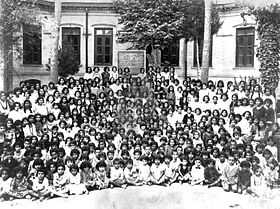Bahá'í school

A Bahá'í school at its simplest would be a school run officially by the Bahá'í institutions in its jurisdiction and may be a local class or set of classes, normally run weekly where children get together to study about Bahá'í teachings, Bahá'í central figures, or Bahá'í administration. Bahá'í topics may be minimized in favor of a general curriculum, often with an internationalist form, with accreditation from a variety of sources.
Prior 1911 a private school for girls existed in Tehran which was opened by Iranian Bahá'í women.[1] During the Persian Constitutional Revolution situations required the close of the school. The successor Tarbiyat-i Banat (Girls’ Education), established in 1911, was the most respected Baha’i girls’ school. Founded on the efforts of private school for girls by Bahá'ís,[1] tt was re-opened under the direction of an Iranian Bahá'í boys’ school committee and several American Bahá'í female pioneers. Even though it catered to the Iranian Bahá'í community, Tarbiyat attracted children from non-Bahá'í families, as the curriculum was largely secular.
Other examples of Bahá'í schools include the Nancy Campbell Collegiate Institute in Canada, the Townshend International School in the Czech Republic, or the New Era High School in India. Bahá'í membership is not required. In Iran, struggles with persecution of Bahá'ís have led to the development of a sophisticated University-like institution (such as the Bahá'í Institute for Higher Education).
In recent years, a trend away from central schools in favour of neighbourhood children's classes has taken hold in most Bahá'í communities, at the urging of the Universal House of Justice. This is not meant to replace central schools but to provide spiritual education on a local basis. In some communities this has resulted in the closing of a central "Sunday school", while in others, both approaches are maintained.
Bahá'í-inspired school
A Bahá'í-inspired school is a school run by an independent agency unaffiliated with any institution of the Bahá'í Faith but with explicit connections - such as having Bahá'ís in its administrative leadership or involved in the founding of the school. While these schools often focus on general ideas from Bahá'í teachings, Bahá'í central figures, or Bahá'í administration, Bahá'í topics are minimized in favor of academic strength. Examples include School of the Nations (Bahá'í - Macau), the Barli Vocational Institute for Rural Women in Indore India and FUNDAEC in Colombia.
References
- ↑ 1.0 1.1 Rostam-Kolayi, Jasamin (Fall 2008). "Origins of Iran's Modern Girls' Schools: From Private/National to Public/State". Journal of Middle East Women's Studies (Indiana University Press) 4 (3): 55–88. doi:10.2979/MEW.2008.4.3.58. JSTOR 10.2979/MEW.2008.4.3.58.
External links
- U.S National Bahá'í Education and Schools Office
- Letter from the Universal House of Justice: Schools owned by Baha'is and "Baha'i schools"
- Bahá'í Schools Directory
- Bahá'í Schools in India
- Links to Baha'i-Inspired Schools & Educational Initiatives
- Bahá'í Youth Resources, Schools, SED Projects
- Association of Bahá'í Educators